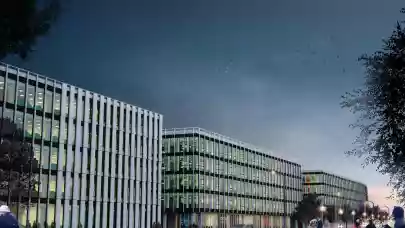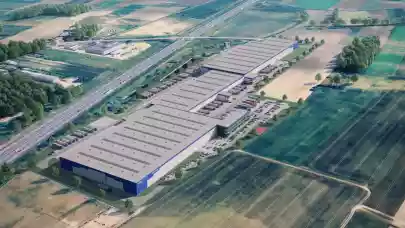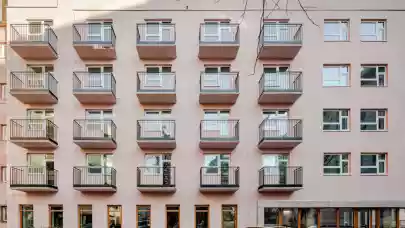
Nicolae Ciobanu, Managing Partner – Head of Advisory at Fortim Trusted Advisors, talked to Property Forum about the firm’s growth in office leasing and land transactions, as well as the outlook on rents and the role of the defense sector in boosting industrial demand going forward.
This interview was first published in Property Forum’s annual listing of "The 50 most influential people in Romania’s real estate market”.
What are some of Fortim Trusted Advisors’ business highlights from last year, and what are your main objectives for 2025?
Over the past three years, Fortim Trusted Advisors has seen continuous growth, with 2024 being particularly successful for our Advisory division. Office leasing activity increased by 70% compared to 2023, and we brokered multiple land sales for commercial use, totaling 10 hectares and up to €5 million per transaction.
In the second half of the year, we also observed increased interest in industrial spaces, supported by Romania’s entry into Schengen.
Our Advisory services—covering office, retail, industrial leasing, valuation, research, and capital markets—complement our Real Estate Management Solutions and Residential business lines, enabling us to offer integrated, one-stop services.
For example, for a plot of land that was purchased four years ago through Advisory, the Residential business line went further and developed the branding, marketing strategy, and sales for a residential complex.
For 2025, our goals include consolidating our market share in our core services and expanding into healthcare and hospitality real estate, responding to shifting investor priorities and emerging client needs.
What new challenges and opportunities do you foresee this year, and how is Fortim adapting to stay ahead?
We are entering 2025 with a strategy focused on diversification and increased service flexibility. The office market is evolving as tenants prioritize ESG-compliant buildings, central locations, and employee-friendly amenities. Our role is to guide clients toward efficient, future-proof spaces.
On the industrial side, we expect continued investor interest, boosted by Romania’s improving infrastructure. However, external risks – particularly in the automotive sector due to global trade dynamics – must be monitored closely. Romania’s supply chain is linked to Germany and France, so we remain cautious. That said, the defense industry, likely to receive increased EU funding, may provide a growth offset in the industrial market.
Which divisions are contributing most to your bottom line?
Advisory remains our top-performing division, driven by strong results in office leasing and land transactions. Capital Markets and Valuation are growing rapidly, and our Residential team has performed well in launching and selling differentiated residential developments. Together, they form a well-balanced, synergistic portfolio.
How will demand for office spaces evolve in Bucharest and regional cities throughout 2025?
We expect steady demand for office space in both Bucharest and major regional cities. In 2024, leasing activity in regional markets (Cluj, Timișoara, Brașov, Iași, Târgu Mureș) reached 63,024 sqm—up 14% year-over-year. Bucharest remains the country’s primary office hub, with over 360,201 sqm leased in 2024, but cities like Cluj-Napoca are catching up—accounting for 72% of regional demand.
At Fortim, our regional leasing volume rose from 18% in 2023 to 25.5% in 2024. While Cluj-Napoca and Brașov led this growth, in 2025, we aim to expand further in Timișoara and Iași.
Among the companies that chose to rent offices through Fortim Trusted Advisors in 2024 are Orange; Square Venture Funshape, in Cluj-Napoca; and Arvato Systems, in Brașov.
What definitive trends have emerged regarding remote work and its influence on office space demand and design?
Hybrid work has become the norm, particularly in IT&C sectors. Most companies now optimize their office footprint to reflect hybrid occupancy levels. Many have returned fitted-out spaces to the market, which are now in high demand due to their affordability and readiness.
With only one new office building (7,000 sqm) set for delivery in 2025, these well-located, second-hand spaces are quickly absorbed—especially those offering strong ESG profiles and employee-friendly features. The office market is shifting from quantity to quality, and our consulting approach helps clients navigate this transformation.
What is your outlook for rent levels in Romania’s commercial real estate sector this year?
We foresee stable to slightly increasing rents in 2025, especially for prime assets. In the office sector, decreasing vacancy rates in quality buildings are enabling modest rent growth. Tenant demand is now heavily concentrated on Class A properties with ESG credentials and premium amenities.
Industrial and logistics rents are expected to remain stable, supported by consistent demand and Romania’s strategic location within the European supply chain. Overall, the market remains resilient, with rent levels reflecting both asset quality and market fundamentals. Continued economic growth and stable interest rates should support this outlook.
What are your expectations for CEE-based commercial real estate investments this year?
We anticipate a cautious but optimistic recovery in the CEE investment market. As interest rates stabilize and pricing expectations align, investor activity is picking up across the region. Romania remains attractive, with Bucharest leading and secondary cities gaining momentum due to improving infrastructure and urban growth.
CEE-wide, sectors like logistics, residential, and convenience retail are drawing increased attention, reflecting changing consumption and distribution patterns. ESG compliance is no longer optional—it’s a decisive factor in asset selection and capital allocation.
Despite global uncertainties, the CEE region presents strong fundamentals and long-term potential. For investors looking for stability and value growth, the Romanian and wider regional markets remain compelling opportunities in 2025.



